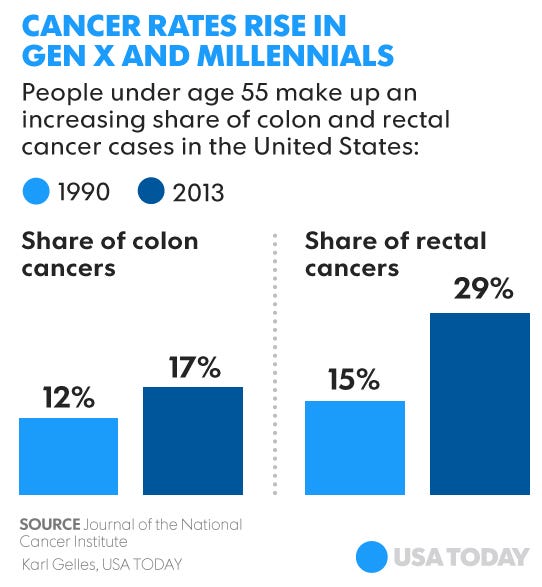Colon and rectal cancers surge among young adults
Colon and rectal cancers have increased dramatically and steadily in millennials and Generation X adults in the United States over the past four decades, a study confirmed Tuesday.

While scientists have not pinpointed an exact cause, prime suspects include obesity, inactivity and poor diets, said researchers from the American Cancer Society, reporting in the Journal of the National Cancer Institute.
“Colorectal cancer had been thought a success story,” because overall rates have fallen as screening has increased among older adults, said lead researcher Rebecca Siegel. “But it appears that under the surface, the underlying risk for colorectal cancer is rising, and it is rising pretty quickly among young adults.”
The result: Someone born in 1990 has double the risk of early colon cancer and quadruple the risk of early rectal cancer as someone born in 1950, Siegel and her colleagues reported. It is likely that millennials and Generation X adults “will carry that risk forward” as they age, she said.
RELATED: Talking cardboard box proving to be lifesaver
RELATED: Cologuard-maker Exact Sciences sees stock jump on revenue rise
The study results were being scrutinized closely Tuesday at Madison-based Exact Sciences Corp., which makes and markets Cologuard, a noninvasive stool test that screens for colorectal cancer.
“The data confirm a trend that we knew about, but this strikes home the point," said Kevin Conroy, the chief executive officer of Exact Sciences. "I think it highlights the need to reevaluate the screening age for colon cancer."
March is colon cancer awareness month and Conroy was in New York on Tuesday preparing for several events scheduled for Wednesday.
Colorectal describes a group of cancers that occur at the lower end of the digestive tract. The American Cancer Society estimates there will be 95,520 new cases of colon cancer and 39,910 new cases of rectal cancer in 2017.
Colorectal cancer is
"Our whole mission is to help lower that mortality rate," Conroy said.
Early detection and removal of pre-cancerous lesions in the colon can often result in eliminating the possibility of developing colorectal cancer. But the screening test is considered unpleasant and intimidating and has a significant "yuck factor" that causes many people to avoid being screened altogether.
That screening avoidance has contributed to colorectal cancer being the second-leading cause (after lung cancer) of cancer death in the United States.
"This report says an appreciable percentage of colorectal cancers will be diagnosed in people under the age of 50 in 15 years," Conroy said. "Right now it’s 15%, and they think it’s going to grow to 25% over time, and you have to take a look at the screening age if that’s the case."
When diagnosed in younger people, "you’re typically diagnosed when you have symptoms, and when you have symptoms it’s typically late stage," when the cancer is the least treatable, Conroy said.
Assuming the recommended screening age is eventually lowered — and that isn't going to happen overnight — Exact Sciences would be prepared to handle a significant number of new screening tests. There are 40 million people between the ages of 40 and 50 in the U.S.
"This is a preventable cancer with screening," Conroy said.
Most of the nation’s 135,000 annual cases and 50,000 deaths related to colon and rectal cancer still occur among people over age 55. But the share of cases involving younger adults has risen to 29% for rectal cancer and 17% for colon cancer, the study showed. About 11,000 people in their 40s and 4,000 under 40 were diagnosed in 2013.
Previous studies detected increases in young adults, but the study provided new age-group details from nearly 500,000 cases reported between 1974 and 2013. For example, it found rectal cancer rates rose an average of 3.2% a year among people in their 30s, starting in 1983.
“We are absolutely seeing this,” in cancer clinics, not only in the United States but around the world, said Thomas Weber, a surgical oncologist who specializes in colorectal cancers and is a professor at the State University of New York Downstate Medical Center.
The latest data should “really raise the alarm,” he said.
Right now, screening is recommended for adults over age 50 and for younger adults with certain genetic syndromes, gastrointestinal disorders or family histories.
Among possible symptoms: bloody stool, cramps, unexplained weight loss and changes in bowel habits that persist more than a few days.
Known risk factors for colon and rectal cancer include obesity, inactivity and diets high in red and processed meat and low in fruits, vegetables and whole grains. The new study did not look at those factors.
Joe Taschler of the Milwaukee Journal Sentinel contributed to this report
